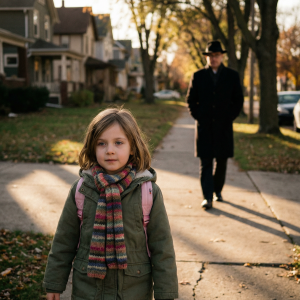The Unraveling of Trust
Something felt fundamentally wrong that October Tuesday when James stumbled through our front door at nearly 9 PM, his explanation about “urgent client meetings” delivered with the kind of nervous energy that accompanies well-rehearsed lies. A strange cologne clung to his shirt—something expensive that I’d never smelled on him before—and when I tried to catch his eye while asking about his evening, he found suddenly urgent reasons to study his phone instead.
Fifteen years of marriage had taught me to recognize the warning signs that preceded earth-shattering revelations. The protective way he now clutched his device, mysterious expenses appearing on our shared credit cards, and an increasing number of “business trips” that never seemed to translate into better commissions—every piece pointed toward a reality I desperately didn’t want to face.
I’m Sarah Mitchell, and I had spent the better part of two decades building what I believed was an unshakeable partnership with James. Our suburban home represented years of shared dreams, our fourteen-year-old daughter Emma was the center of our universe, and our joint financial planning had always reflected perfectly aligned priorities and unwavering mutual trust.
James earned his living as a pharmaceutical sales representative, a position that demanded occasional overnight travel but had consistently provided our family with solid income and comprehensive benefits. When Emma entered middle school, I had resumed my career as a freelance marketing consultant, balancing professional projects with the flexibility needed for school activities and family commitments.
Our relationship hadn’t been the stuff of romance novels, but it possessed the kind of steady dependability that I treasured above passion. We cheered together at Emma’s volleyball matches, planned modest but meaningful family adventures, and maintained what I considered an honest alliance built on shared principles and genuine respect.
The destruction of that foundation occurred so gradually that I almost missed it entirely—small betrayals accumulating until the pattern became impossible to ignore or explain away.
Gathering Evidence in Silence
Instead of confronting James directly about my growing suspicions, I decided to quietly collect proof while maintaining our family’s normal rhythm. My background in marketing had sharpened my ability to notice inconsistencies and details that others might dismiss, and I turned those analytical skills toward investigating my own household.
The proof materialized slowly but relentlessly. Restaurant receipts tucked into suit pockets from establishments in cities where James claimed to have brief day meetings that shouldn’t require hotels. Unexplained schedule gaps that didn’t match his official company calendar. A renewed interest in personal grooming that included costly skincare products and clothing purchases he tried to hide from our budget conversations.
Most revealing was how dramatically his engagement with Emma and me had shifted. The father who had once eagerly helped with algebra homework and attended every school event now seemed distracted and irritable during family dinners. Our previously effortless conversations devolved into mechanical exchanges about logistics and schedules.
James occupied the same physical space but had mentally relocated elsewhere, performing family obligations while his real enthusiasm was clearly directed toward something—or someone—outside our home. He would sit at our kitchen table responding to texts with barely concealed excitement, insisting they were work-related while displaying the kind of anticipation that had nothing to do with pharmaceutical sales.
The financial discrepancies took longer to identify, but my increasing wariness prompted me to examine our banking records with fresh scrutiny. I uncovered charges at boutique restaurants I’d never heard of, purchases from stores specializing in women’s accessories and jewelry, and cash withdrawals that James couldn’t explain when I casually inquired about our spending habits.
The discovery that truly shattered my remaining denial was realizing that James had been systematically draining Emma’s college savings account. The withdrawals were small enough to avoid automatic alerts, but frequent enough to represent a devastating assault on funds we’d sacrificed to accumulate over years of careful financial discipline.
This transgression crossed a line that I refused to let him blur with explanations or promises. Our marriage might be dissolving, and I might be willing to accept that our partnership had ended, but I absolutely would not allow him to destroy our daughter’s educational opportunities to finance whatever secret relationship he was maintaining.
Strategic Protection
My response to uncovering James’s theft was methodical and absolute. Rather than immediately confronting him, I took decisive action to safeguard both Emma’s college fund and my own financial security before James realized his activities had been discovered.
I transferred the entire college savings balance to a new account at a different institution—one requiring only my authorization for access. Additionally, I moved exactly half our joint savings into a personal account, leaving sufficient funds in our shared accounts for household operations while protecting assets I had earned through my own efforts and our collective sacrifices.
These weren’t vindictive moves, but practical responses to James’s demonstrated willingness to exploit our family’s resources for his personal gratification. If he was prepared to steal his daughter’s educational future, no financial boundary would stop him from causing additional damage if given continued unrestricted access.
I also began meticulously documenting James’s behavioral patterns, creating detailed records of his absences, his explanations for those absences, and evidence that contradicted his claims. This documentation wasn’t for immediate confrontation, but I recognized that when our marriage inevitably ended in divorce, having comprehensive records of his deception and financial misconduct might prove essential for protecting Emma’s welfare.
The most challenging aspect of this period was sustaining normal family routines while internally preparing for what seemed like an unavoidable reckoning. I continued preparing meals, assisting Emma with schoolwork, and participating in her activities while privately processing the reality that my marriage was disintegrating.
Fortunately, Emma remained oblivious to the growing tension between her parents. At fourteen, she was absorbed in her own social world and academic responsibilities, interpreting her father’s increased absences as typical adult work demands. Shielding her from the approaching adult drama became one of my strongest motivations for handling everything with maximum dignity and discretion.
The Night Everything Collapsed
The crisis that demolished James’s elaborate deception arrived on a December evening when his reckless behavior finally produced consequences he couldn’t manipulate or charm his way out of.
I was helping Emma study for her history final when my phone buzzed at 11:47 PM. The caller identified herself as a charge nurse at Metropolitan General Hospital’s emergency department, and her opening words made my stomach drop.
“Mrs. Mitchell? This is Linda Chen from Metro General’s emergency room. Your husband James Mitchell was brought in tonight with a medical situation, and we need immediate family here for insurance authorization and treatment consent.”
The clinical details she provided were professional but devastating in their implications. James had arrived at the emergency room with a young woman, both requiring urgent medical attention for what the staff diplomatically described as “complications from strenuous physical activity.”
The nurse’s careful phrasing couldn’t obscure what had actually occurred. James and his companion had engaged in activities that resulted in medical emergencies requiring immediate intervention, and the hospital needed family consent for continued treatment while they stabilized both patients.
“I’ll be there once I arrange supervision for my daughter,” I responded, my voice remaining steady despite the emotional tsunami crashing through my thoughts.
The thirty-minute drive to the hospital provided crucial time to process what awaited me and decide how I intended to handle the confrontation that was now unavoidable. By the time I reached the emergency department, I had achieved a state of crystalline clarity about the situation and my response to it.
The Hospital Showdown
Metropolitan General’s emergency department was a fluorescent-lit labyrinth of curtained treatment areas, sophisticated medical equipment, and the organized chaos that defines trauma care. I located James in a private room, connected to monitoring devices and receiving IV fluids while a young woman I’d never encountered occupied the adjacent bed.
Both appeared exactly as I would have predicted—exhausted, mortified, and obviously dealing with medical complications that reflected poor judgment as much as physical distress. James’s complexion was ashen and strained, his typical self-assurance replaced by visible panic as he grasped the implications of my arrival.
The woman, who looked to be in her late twenties with platinum blonde hair and the kind of meticulously maintained appearance that suggested considerable investment in her image, was sobbing quietly while trying to avoid eye contact with everyone present.
“Sarah,” James croaked when he noticed me, his voice rough and desperate. “I can explain this whole situation. This isn’t what you think it is.”
The sheer absurdity of his statement given their obvious circumstances might have been laughable under different conditions. But observing my husband of fifteen years lying in a hospital bed beside the woman he’d been betraying our family to pursue, I felt only profound grief for the waste of everything we had once shared.
“I’m here for the paperwork,” I stated calmly, addressing the nurse who had accompanied me into the room. “What documents require my signature?”
The medical team efficiently processed the administrative necessities while James and his companion observed me with mounting desperation. They had clearly anticipated emotional outbursts, furious accusations, or hysterical breakdowns—reactions that might have given James opportunities to manipulate the situation or deflect accountability for his choices.
Instead, my composed efficiency in managing the medical bureaucracy while treating him like a complete stranger seemed to disturb him far more than screaming would have achieved.
The Financial Revelation
The moment that crystallized everything occurred when the hospital’s billing coordinator approached with forms requiring immediate payment for the emergency treatment both patients had received.
“The current treatment costs total $12,300,” she explained, “and we need either insurance pre-authorization or direct payment to continue providing care. Mr. Mitchell offered this card, but our system rejected it.”
She returned James’s wallet, which contained the bank card he’d attempted to use—the card linked to Emma’s college savings account that I had closed three weeks earlier.
James’s expression cycled through multiple shades of panic as he realized his access to our family’s finances had been discovered and eliminated. The woman beside him began crying harder when she comprehended that the financial resources James had guaranteed were no longer accessible.
“I don’t have money for any of this,” she wailed between sobs. “James promised he would cover everything. He swore he would handle all the costs.”
The pitiful nature of their predicament—reduced to panic about medical bills while lying in beds that bore witness to their betrayal of everyone who had trusted them—might have inspired compassion under different circumstances. But I felt only cold satisfaction that James was finally experiencing genuine consequences for his actions.
“The card was rejected because I closed that account,” I said, my tone carrying no emotion beyond simple factual reporting. “I discovered my husband was stealing from our daughter’s college fund to finance his recreational activities.”
James struggled to sit up despite the IV lines and monitoring equipment, his panic overwhelming medical advice to remain motionless. “Sarah, please. I can make this right. I made terrible mistakes, but we can fix this. Don’t let them stop treatment over money.”
His plea revealed everything about how he’d been conceptualizing our marriage and family. Even in this moment of complete exposure and humiliation, his primary focus was avoiding immediate consequences rather than acknowledging the profound damage he had inflicted.
The Final Choice
The decision facing me in that hospital room was simple in its clarity, despite being devastating in its implications. I could pay for James’s emergency treatment, essentially rescuing him from the immediate fallout of his betrayal while enabling him to continue the destructive patterns that had brought us to this crisis. Or I could allow him to experience the complete weight of his choices while protecting myself and Emma from further harm.
“I will not be covering this treatment,” I informed the billing coordinator, my voice unwavering and final. “James Mitchell is an adult who made deliberate decisions about how to spend our family’s money. He can determine how to handle the consequences of those decisions.”
The impact of my words on both James and his companion was immediate and devastating. They had obviously expected that family loyalty, social pressure, or basic human compassion would compel me to rescue them from their crisis.
Instead, they were confronting the reality that actions produce consequences that cannot be avoided through manipulation, tears, or appeals to obligations they had already destroyed through their own behavior.
“Sarah, please,” James pleaded, his voice cracking with desperation. “I’m still your husband. I’m still Emma’s father. You can’t just abandon me like this.”
The irony of his appeal to family devotion while lying beside the woman he’d been betraying us with was so complete that I actually smiled—not with amusement, but with the bitter recognition of how thoroughly he had demolished his own position.
“You abandoned your family the moment you began stealing from your daughter’s college fund to impress your girlfriend,” I replied. “I’m not abandoning you. I’m simply refusing to enable your self-destructive behavior any longer.”
The Aftermath and Reconstruction
I walked out of that hospital with a sense of purpose that had been missing from my life for months. The illusion that my marriage could be salvaged was finally shattered, replaced by concrete plans for protecting Emma’s future and reconstructing our lives without James’s toxic influence.
The divorce papers I submitted that following Tuesday were straightforward and focused on ensuring Emma’s welfare was prioritized while minimizing the conflict and drama that could harm her emotionally. I requested primary custody with reasonable visitation for James, assuming he could stabilize his life sufficiently to be a positive influence on his daughter.
The financial settlement was pragmatic rather than punitive. I retained our home so Emma could maintain stability in her school and social environment, kept the college savings that James had tried to steal, and took responsibility for supporting myself through my consulting work rather than pursuing alimony that might create ongoing battles.
Five years later, the contrast between our lives provides clear evidence of how choices create lasting consequences. James never fully recovered from the financial and emotional chaos that followed our marriage’s end, while Emma and I built a life characterized by honesty, stability, and mutual respect—a life infinitely better than the deception-filled existence we’d been maintaining.
The night I refused to pay James’s hospital bills wasn’t the most painful moment of my life—it was the beginning of my liberation.





